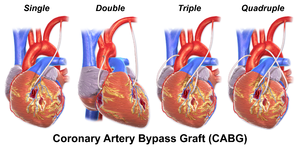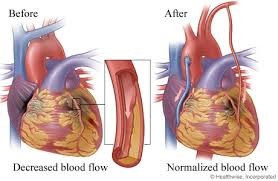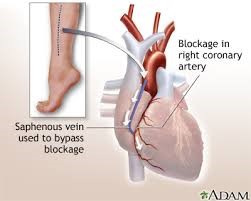By Pass Surgery: Its Basics
Heart bypass surgery, or coronary artery bypass surgery, is used to replace damaged arteries in your heart muscle. A surgeon uses blood vessels taken from another area of your body to repair the damaged arteries. Doctors performed 213,700 such surgeries in the United States in 2011.
This surgery is done when coronary arteries become blocked or damaged. These arteries supply your heart with oxygenated blood. If these arteries are blocked, or blood flow is restricted, the heart doesn’t work properly. This can lead to heart failure.
Imagine you’re on a highway. An accident causes traffic to pile up ahead. Emergency crews redirect cars around the congestion. Finally, you’re able to get back on the road and the route is clear.
If you need heart bypass surgery, the procedure is pretty similar. A surgeon takes blood vessels from another part of your body to go around, or bypass, a blocked artery. The result is that more blood and oxygen can flow to your heart again.
It can help lower your risk for a heart attack and other problems. Once you recover, you’ll feel better and be able to get back to your regular activities.
Bypass surgery is also known as coronary artery bypass grafting (CABG). It’s the most common type of open-heart surgery in the U.S. Most people have great results and live symptom-free for a decade or more.
Why might a person need heart bypass surgery?
When a material in your blood (plaque) builds up on your arterial walls, less blood flows to the heart muscle. The muscle is more likely to become exhausted and fail if it’s not receiving enough blood.
Any damage this creates most often affects the left ventricle, the heart’s primary pump.
Your doctor may recommend heart bypass surgery if your coronary arteries become so narrowed or blocked that you run a high risk of a heart attack.
This condition is called coronary artery disease, or atherosclerosis. Your doctor will recommend bypass surgery when the blockage is too severe to manage with medication or other treatments.
Bypass surgery treats symptoms of coronary heart disease. That happens when a waxy substance called plaque builds up inside the arteries in your heart and blocks blood and oxygen from reaching it. You may feel things like:
- Chest pain, which is known as angina
- Irregular heartbeat
- Shortness of breath
Coronary heart disease can lead to a heart attack. It can cause a blood clot to form and cut off blood flow. Bypass surgery can give your ticker a big health boost.
How Does It Work?
A surgeon removes a blood vessel, called a graft, from another part of your body, like your chest, leg, or arm. He attaches one end of it to your aorta, a large artery that comes out of your heart. Then, he attaches the other end to an artery below the blockage.
The graft creates a new route for blood to travel to your ticker. If you have multiple blockages, your surgeon may do one or more bypass procedures during the same surgery.
You’ll be asleep the whole time, about 3 to 6 hours on average.
Preparation of Surgery
If your doctor recommends heart bypass surgery, they’ll give you complete instructions on how to prepare. If the surgery is scheduled in advance and is not an emergency procedure, you’ll most likely have several preoperative appointments where you’ll be asked about your health and family medical history.
You’ll also undergo several tests to help your doctor get an accurate picture of your health. This test may include:
- blood samples
- chest X-ray
- electrocardiogram (ECG or EKG)
- angiogram
What are the risks of heart bypass surgery?
As with any open-heart surgery, heart bypass surgery carries risks. Recent technological advancements have improved the procedure, increasing the chances of a successful surgery.
There is still a risk for some complications after surgery. These complications could include:
- Bleeding
- Arrhythmia
- blood clots
- chest pain
- infection
- kidney failure
- low-grade fever
- temporary or permanent memory loss
- heart attack or stroke
Alternatives to heart bypass surgery
In the past decade, more alternatives to heart bypass surgery have become available. These include:
Balloon angioplasty
Balloon angioplasty is the most common doctor-recommended alternative to heart bypass surgery. During this treatment, a tube is threaded through your blocked artery. Then, a small balloon is inflated to widen the artery.
The doctor then removes the tube and the balloon. A small metal scaffold called a stent will be left in place. A stent keeps the artery from contracting back to its original size.
Balloon angioplasty isn’t as effective as heart bypass surgery, but it’s less risky.
Enhanced external counter pulsation (EECP)
EECP is an outpatient procedure. It’s been shown to be an effective alternative to heart bypass surgery. In 2003, it was approved by the U. S. Food and Drug Administration (FDA) for use in people with congestive heart failure.
EECP involves compressing blood vessels in the lower limbs. This increases blood flow to the heart. The extra blood flow is delivered to the heart with every heartbeat. Over time, some blood vessels may develop extra “branches” that will deliver blood to the heart, becoming a sort of “natural bypass.
EECP is administered daily for a period of one to two hours each day over the course of seven weeks.
Medications
There are some medications you may consider before resorting to heart bypass surgery or any other methods. Beta-blockers can relieve stable angina. Cholesterol-reducing drugs can slow plaque build-up in your arteries.
Also, most doctors agree that a daily dose of baby aspirin (low-dose aspirin) can help prevent heart attacks in high-risk individuals.
Diet and lifestyle changes
The best preventative measure is a “heart-healthy” lifestyle, as prescribed by the American Heart Association (AHA). Eating a diet high in omega-3 fatty acids and avoiding saturated and Trans fats help.
Performance
Before the surgery
Before surgery, you’ll change into a hospital gown and receive medication, fluids, and anaesthesia through an IV. When the anaesthesia begins working, you’ll fall into a deep, painless sleep.
The surgery
Your surgeon will start by making an incision in the middle of your chest. Your rib cage is then spread apart to expose your heart. Or your surgeon may opt for minimally invasive surgery. This involves smaller cuts and special miniaturized instruments.
You will be hooked up to a cardiopulmonary bypass machine. Also known as the heart-lung machine, it circulates oxygenated blood through your body while your surgeon operates on your heart.
Blood will be pumped out of your heart by the machine to remove carbon dioxide, and the machine will then be filled with oxygen. The oxygenated blood is pumped back into your body without going through the heart and lungs. This keeps oxygenated blood pumping throughout your body. Some procedures are performed “off-pump,” meaning that connecting you to the heart-lung machine isn’t necessary.
Your surgeon will also use cooling techniques, sometimes called “extreme cooling,” to bring your body temperature down to around 64.4°F (18°C). This technique suspends your body’s processes and makes long heart surgeries possible. Your heart needs less oxygen when your body temperature is lowered. Your doctor will cool down your heart with the help of the heart-lung machine or by dousing your heart in cold, salty water.
Cooling techniques allow your doctor to operate on your heart tissue for a few hours at a time. These techniques decrease the risk of heart damage or brain damage from a lack of oxygen.
Your surgeon will then remove a healthy blood vessel from inside your chest wall or leg to replace the blocked or damaged artery. When your surgeon is done, the heart-lung machine is removed, and the function of the bypass is checked. Once the bypass is working you’ll be stitched up, bandaged, and taken to the intensive care unit (ICU) for monitoring.
After surgery
you’ll wake up in an intensive care unit (ICU). You’ll have a tube in your mouth to help you breathe. You won’t be able to talk and will feel uncomfortable. Nurses will be there to help you. They’ll remove the tube after a few hours, when you can breathe on your own.
You’ll also be hooked up to machines that monitor your vital signs, like your heart rate and blood pressure, around the clock. You’ll stay in the ICU for a few days before being moved to a hospital room. You’ll stay there for about 3 to 5 days before you go home.
What Will the Recovery Be Like?
- It’s a gradual process. You may feel worse right after surgery than you did before. This is normal. Your body needs time to recover, but you’ll feel better each day.
- You won’t be fully healed for about 2 months. Be sure to follow your doctor’s instructions.
- You may not be able to drive for 3 to 8 weeks.
- You’ll visit your doctor several times during the first few months to track your progress. Call him if your symptoms don’t improve or you’re feeling worse.
Medications
Your doctor will give you medications to help manage your pain, such as ibuprofen (Advil) or acetaminophen (Tylenol). You may also receive Percocet, which contains both acetaminophen and oxycodone. Your doctor will also give you medications to help you throughout your recovery process. These will include antiplatelet drugs and angiotensin converting enzyme (ACE) inhibitors.
Talk to your doctor about what medication plans are best for you. This is especially important if you have existing conditions like diabetes or conditions affecting the stomach or liver.
After effects
After a successful heart bypass surgery, symptoms such as shortness of breath, chest tightness, and high blood pressure will likely improve.
A bypass can fix a blocked artery, but you may need to change some habits to prevent future heart disease. The best surgery outcomes are observed in individuals that make healthy lifestyle changes. Talk to your doctor about dietary and other lifestyle changes to make after surgery.
